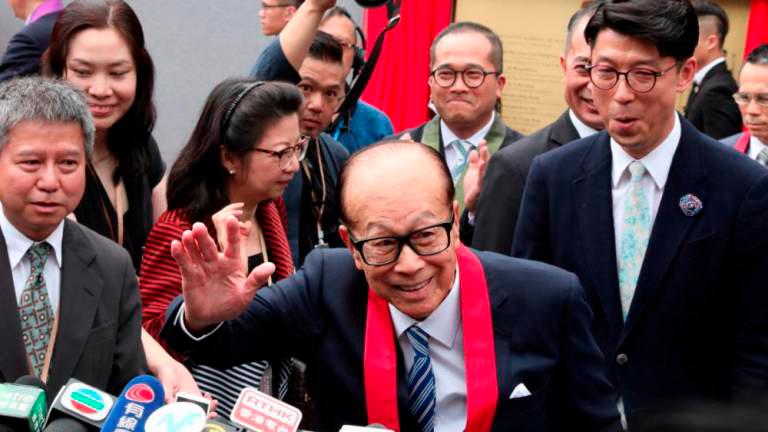SINGAPORE: Forbes Asia today unveiled its annual Heroes of Philanthropy list, highlighting 15 altruists in the Asia-Pacific region who are committed to causes ranging from Covid-19 relief to the arts and education. The full list can be found at www.forbes.com/altruists and in the November issue of Forbes Asia.
For this 14th annual roundup, Forbes Asia sifted through dozens of candidates for individual philanthropists who are donating from their personal fortunes. Some of the biggest donors this year focused on the Covid-19 pandemic. Several were prompted to build hospitals, provide protective equipment or fund medical research.
Hong Kong tycoon Li Ka-shing (pix) channeled HK$250 million (US$32 million) into various forms of aid through the Li Ka Shing Foundation, including HK$100 million to communities in Wuhan — the epicenter of the outbreak in China. In addition, Li also donated HK$1 billion in relief funds in late 2019, benefitting over 28,000 local businesses hit hard by the city’s political unrest.
Fast Retailing chief and Japan’s richest man Tadashi Yanai gave ¥11.2 billion to two universities in the country over the past year. This includes a ¥10 billion donation to Kyoto University to facilitate research on diseases and to develop a vaccine for the coronavirus.
Li Shufu, chairman of Geely Automobile Holdings, donated US$28 million in January to help combat Covid-19 through his Zhejiang Li Shufu Charity Foundation, which he established in 2006 for a range of causes, including education, disaster relief and medical aid.
Property tycoons and brothers Robert and Philip Ng have made pandemic-focused needs a top priority for their family foundation this year. Their Hong Kong-based Ng Teng Fong Charitable Foundation contributed 50 million yuan ($7.4 million) in March to Tsinghua University in Beijing to support Covid-19 research. Their other donations included seven million masks, 60,000 meals, 4,200 care packs to elderly home workers, 20 ventilators and two mask-making machines in Hong Kong, Singapore and elsewhere.
Pandemic relief was not the only focus this year. Pham Nhat Vuong, Vietnam’s richest man and majority owner of the diversified Vingroup, donated $77 million this year through his charity, the Kind Heart Foundation, to help needy people with educational scholarships and free healthcare programmes in the country.
Separately, Vingroup spent US$55 million on various Covid-19 causes as well. Manuel Villar, chairman of Vista Mall and Vista Land & Landscapes, grew up poor and credits education for shaping his character. He gifted two parcels of land with a combined value of 8 billion pesos ($165 million) to Manila’s Saint Jude Catholic School and the University of the Philippines, his alma mater.
Li Xiting, chairman of Shenzhen Mindray Bio-Medical Electronics, one of China’s largest medical device makers, gave 107 million yuan ($16 million) in June to his alma mater, the University of Science and Technology of China. It was the largest personal donation received by the university in its more than 60-year history and will be used to establish the Li Xiting Foundation for talent recruitment and development.
Eleanor Kwok Law Kwai Chun, cofounder of Asia’s beauty retail giant Sa Sa, has given away more than HK$70 million ($9 million) to various charitable causes. This includes HK$47 million to Po Leung Kuk, which was founded during the 19th century as the Society for the Protection of Women and Children. Today the organisation which Kwok chaired from 2016 to 2017, is committed to a range of causes: cultural, educational, elderly care, healthcare and social services.
Billionaire Rakesh Jhunjhunwala aims to donate US$750 million within his lifetime. His namesake foundation backs causes such as education and healthcare. He has donated half of the $7.5 million he pledged for a new eye hospital near Mumbai that will offer the underprivileged free cataract surgeries and is slated to open next year. He has also committed US$17 million to Ashoka University by 2022, and donates US$1 million annually to the Agastya International Foundation, which provides science education to the rural poor.
In July, real estate entrepreneur and chairman of Gwangwon Industry Lee Su-young donated 68 billion won of Seoul real estate to Korea Advanced Institute of Science and Technology (KAIST), marking the largest donation the university has received. Lee said the donation was made in the hope of producing a Nobel Prize laureate in science from South Korea. This is in addition to the US$8 million worth of real estate in Los Angeles that Lee had previously donated to KAIST.
Mall magnate John Gandel and his wife, Pauline, have donated A$250 million to Gandel Philanthropy since its launch in 1978. In the past year, the foundation has provided A$2.3 million in emergency relief for two crises in Australia - the summer’s bushfires and Covid-19. Gandel
Philanthropy has distributed more than A$100 million in grants in Australia and overseas to support the arts, education, and health and medical research.
The Heroes of Philanthropy list does not include donations made by companies of Asia’s richest tycoons, unless the giving was made via a privately held company in which they are the majority owners. As in previous years, fundraisers or heads of nonprofits are not included although they play an important role.
The full list can be found at www.forbes.com/altruists













